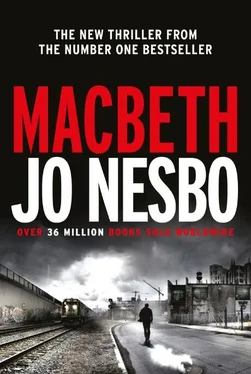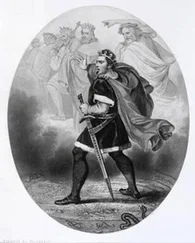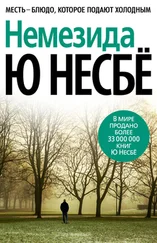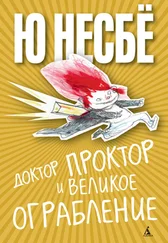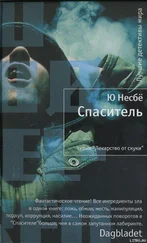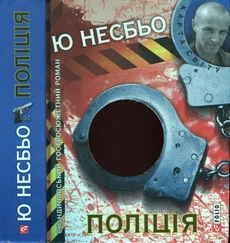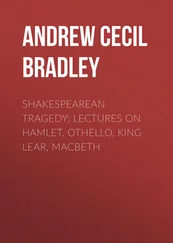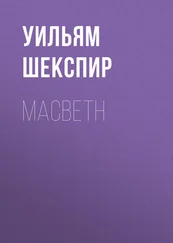‘Jack,’ Macbeth said without moving or taking his eyes off the psychiatrist.
‘Yes, sir.’
‘Show him.’
‘But...’
‘He’s bound by the Hippocratic oath.’
Jack unwound the cloth from the bundle and held it out for the doctor. He took a step back covering his nose and mouth with his hand.
‘She thinks it’s hers,’ Macbeth said. ‘If not for my sake and hers, then for the town’s, Doctor.’
Macbeth felt a strange pressure in his ears as the door closed behind him. Finally, he thought, I’m in the nuthouse. The walls of the little square room, where three people sat observing him, were padded, although there was a window.
‘Don’t be afraid,’ said the man at the table in front of him. ‘I’m just going to ask a few questions. It’ll all be over soon.’
‘It’s not the questions I’m frightened of,’ Macbeth said, sitting down, ‘it’s the answers.’
The man smiled, the music from the speaker above the window died, and he put a finger to his mouth as a red light on the wall came on.
‘This is Rolling News with Walt Kite,’ the man trilled, turning to the mike in front of him. ‘We have a visit from the town’s new favourite, Chief Commissioner Macbeth, who after wiping out one of the town’s most notorious drugs gangs, the Norse Riders, is now tirelessly chasing their corrupt collaborators inside the police’s own ranks. He has won the hearts of the people and lifted their hopes with inspiring speeches in which he says we’re entering new times. Chief Commissioner Macbeth, isn’t this just rhetoric?’
Macbeth cleared his throat. He was up for this. He was a new man. Once again he was perfectly medicated. ‘I’m a simple man and I don’t know much about rhetoric, Walt. I’ve only said what was on my mind. And that is that if this town has the will it has the muscle power to raise itself. But neither the chief commissioner nor politicians can lift a town; its citizens have to do that themselves.’
‘But they can be inspired and led?’
‘Naturally.’
‘You’re already being touted as mayor material. Is this something that might tempt you, Chief Commissioner Macbeth?’
‘I’m a police officer and I wish only to serve the town in the job I have been appointed to.’
‘As a humble servant of the people, in other words. Your predecessor, Duncan, also saw himself as a servant of the people, though he wasn’t so humble. He promised to catch the town’s most powerful criminal, Hecate, also known as the Invisible Hand, within a year. Now, you’ve dealt with the Norse Riders. What deadline have you set yourself for Hecate?’
‘First, let me say there is a reason for the name the Invisible Hand. We know very little about Hecate, only that he’s probably behind the manufacturing of the drug called brew. But given its widespread production and distribution it’s equally probable that we’re talking about a network or a shared supply chain.’
‘Do I hear you saying you’re not going to prioritise the arrest of Hecate as highly as Duncan did?’
‘What you hear is a chief commissioner refusing to use all his resources on arrests that might make headlines, bring honour to the police and lead to clinking champagne glasses in the town hall, but in reality do little for people’s everyday lives. If we arrest a man by the name of Hecate others will take over his market unless we tackle the town’s real problem.’
‘Which is?’
‘Jobs, Walt. Giving people work. That’s the best and the cheapest initiative against crime. We can fill our prisons, but as long as we have people walking the streets without food...’
‘Now you really sound as if you’re considering standing for election.’
‘I don’t care what it sounds like. I only want this town back on an even keel.’
‘And how will you do that?’
‘We can do that by ensuring this becomes a town where we take account of both investors and workers. Investors mustn’t get away with not paying taxes into the common pot or bribing their way to privileges. But the town can give them the sure knowledge that rules are being followed. And workers should know that their workplace isn’t poisoning them. Our recently deceased hero Banquo lost his wife Vera several years ago. She had breathed in poisonous fumes at the factory where she worked for many years. Vera was a lovely hard-working wife and mother. I knew her personally and loved her. As chief commissioner I promise the town that none of its future workplaces will take the lives of any more Veras. There are other ways of finding employment for people. Better ways. Which will give them a better life.’
Macbeth could see from Walt Kite’s grin that he was impressed. Macbeth was impressed himself. He had never been so clear-thinking. It had to be the new powder, delivering the words, so concise and logical, from the brain to the tongue.
‘Your popularity has grown quickly — exponentially — Chief Commissioner. Is that why you dare to make statements that, if I were Mayor Tourtell, I would regard as a challenge? Formally speaking, he is your boss and has to endorse your appointment to the post of chief commissioner. Otherwise you don’t have a job.’
‘I have more bosses than the mayor, Walt, among them my own conscience and the citizens of this town. And for me my conscience and this town are above a comfy chair in the chief commissioner’s office.’
‘In four months there are elections for a new mayor, and the closing date for nominations is in three weeks.’
‘If you say so, Walt.’
Walt Kite laughed and raised an arm above his head. ‘And with that we say thank you to Chief Commissioner Macbeth. I’m not so sure he’s telling us the truth when he says he knows nothing about rhetoric. And now here’s Miles Davis...’ He dropped his arm and pointed to the window. The red light went out, and the sound of a soft, dry trumpet filled the speakers.
‘Thank you.’ Kite smiled. ‘ No one will take the lives of any more Veras? You are aware that you could be elected as mayor on that sound bite alone, aren’t you?’
‘Thanks for the interview,’ Macbeth said without moving.
Kite glanced at him questioningly.
‘Did I hear you aright?’ Macbeth said slowly in a low voice. ‘Did you accuse me of lying at the end there?’
Kite blinked, taken aback. ‘Lying?’
‘ I’m not so sure he’s telling us the truth when he... ’
‘Oh, but that—’ the reporter’s Adam’s apple jumped ‘—was just a joke of course, a... erm, way of speaking, a...’
‘I was just teasing.’ Macbeth smiled and got up. ‘See you.’
As Macbeth left the radio building in the rain he felt that Walt Kite wouldn’t be a problem any more. And as he sat in the back of the limousine he felt that the Obelisk, Duff and Lady’s illness weren’t going to be problems any more either. Because he was thinking more clearly than ever.
‘Drive a bit more slowly,’ he said.
He wanted to enjoy the trip through the town. His town.
True enough, it wasn’t his yet, but it soon would be. Because he was invincible. And perfectly medicated.
While they were waiting at some red lights his gaze fell on a man waiting by the crossing, although the pedestrian light was green. His upper body and face were hidden by a large black umbrella, so all Macbeth could see was his light-coloured coat, brown shoes and the big black dog he was holding on a lead. And a thought struck Macbeth. Did the dog wonder why he was owned, why he was on a lead? He gets a little food, his allotted portion, just enough for him to prefer security to insecurity, to be kept in check. That is all that stops the dog from trotting over to the owner while he is asleep, tearing out his throat and taking over the house. For that is all he has to do. Once you realise how to open the pantry door it is actually the natural response.
Читать дальше
